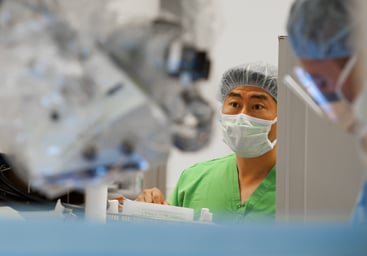The NIH has funded a five-year, $21 million Integrative Neuroscience Initiative on Alcoholism grant to support a multi-site consortium led by Oregon Health & Science University researchers Kathleen A. Grant and Betsy Ferguson. The grant represents the second competitive renewal for the INIA consortium (founded in 2001), which is made up of 15 lead investigators from 10 institutions in the United States and Europe. OHSU's share of the current funding is $6.3M. Dr. Grant is the head of neuroscience at the Oregon National Primate Research Center (ONPRC), where Dr. Ferguson is an associate scientist. The Division of Neuroscience at the ONPRC conducts research aimed at identifying and defining fundamental aspects of the cellular and molecular mechanisms underlying nervous system function.
Tags: Northeast, Oregon Health Sciences University, cell biology, women in science, Oregon, alcoholism research, Neuroscience, BioResearch Product Faire Event, OHSU, Portland, BRPF, life science partners
Thanks to a longtime Minnesota philanthropist and the State of Minnesota, neuroscience and diabetes researchers at the University of Minnesota and the Mayo Clinic are looking at millions in research grant funding from two new programs:
Tags: Midwest, 2012 Research Funding, University of Minnesota, Diabetes, Minnesota, Mayo Clinic, Neuroscience, Funding, new research grants
Tags: University of California Los Angeles, biomedical sciences, biomedical research, Southwest, California, Los Angeles, Neuroscience, UCLA
New research from Columbia University’s Taub Institute for Research on Alzheimer’s Disease and the Aging Brain shows that silent strokes may be the cause of memory loss in aging people. Dr. Adam M. Brickman, Ph.D. and Herbert Irving Assistant Professor of Neuropsychology at Columbia University College of Physicians and Surgeons, told Neurology that what’s new about his research is that it “examines silent strokes and hippocampal shrinkage simultaneously.” In the past, experts believed memory loss in the elderly was a result of deterioration in the hippocampus. While there’s truth in this logic, Dr. Brickman says that silent strokes (strokes so small they may go unnoticed) also contribute to the problem of memory loss in older people.
Tags: Northeast, New York, Columbia University, Alzheimer' Research, Neuroscience, New York City
An anonymous gift of $16 million in science research funding to the Raymond and Ruth Perelman School of Medicine at the University of Pennsylvania will fund the establishment of the Neuroscience of Behavior Initiative, which aims to strengthen Penn’s program in basic, translational, clinical and population research into the areas of addiction, depressive disorders and neurodegenerative disease. The gift is the single-largest donation for neuroscience research in the school’s history.
Tags: Pennsylvania, Northeast, 2012 Research Funding, Neuroscience, Philadelphia, science research, Biomedical Research Funding, scientific sales, Penn Medicine, science research funding
When the University of California Berkeley (UCB) decided to actively recruit acclaimed neurologist Dr. Zhigang He away from his research position at Harvard Medical School's Children's Hospital, they knew a critical component of the package they could offer him would be a promise of substantial funding for his stem cell research on the human nervous system in his new lab. To secure this funding, UCB applied to and received a promise of $5.6M in research funding for He from the California Institute for Regenerative Medicine (CIRM), a statewide initiative supported by taxpayer-approved bonds.
Tags: 2012 Research Funding, University of California Berkeley, Stem cell research, California, University of California, Neuroscience, Funding, UC Berkeley, CIRM
Tags: Northeast, New research facilities, New York, Stony Brook University, Neuroscience, New York City
The NSF has just announced funding for a new program to establish four Engineering Research Centers (ERCs) with over $70M in grants. One of the four universities chosen to participate in the program is the University of Washington, which will receive $18.5M over the next five years for its ERC for Sensorimotor Neural Engineering (ERC/SNE). Researchers will be designing and testing devices to restore or augment the body's capabilities for sensation and movement. UW's Neurobotics Lab will take a lead in the ERC/SNE, along with biologists and scientists focused on human health.
Tags: Washington, University of Washington, Northwest, Neuroscience, Robotics, NSF

San Antonio is about to celebrate the opening of a major new science research building: the STRF, or South Texas Research Facility on the campus of the University of Texas Health Science Center. The 190,000sf state-of-the-art research facility is stretched over only three floors, so the building is low and long: 1000 feet long. If you tipped over the Eiffel Tower...well, you get the idea. UTHSCSA started planning the new lab and office space three years ago when it became clear that their research faculty was growing at a healthy rate, but their facilities were not keeping up. When it is fully occupied, the STRF will house 350 faculty and staff members. Plans are to fill 60% of the building with current faculty and their research teams and to use the remaining space for new recruits, specifically 15 to 20 top scientists and their associates to be brought on board.
The four core programs moving to the STRF are:
Tags: Stem cell research, cancer research, New research facilities, Texas, Southwest, UT Health Science Center San Antonio, Neuroscience




